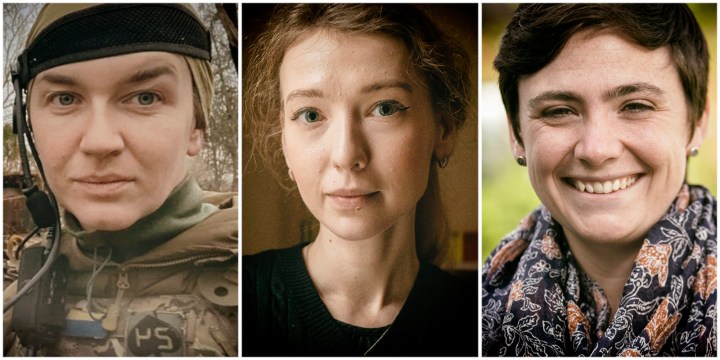DAILY MAVERICK WEBINAR
Standing up to war crimes: Stories from Ukraine’s frontline

It has been 18 months since Russia launched its full-scale invasion of Ukraine. Although the war is less prominent in the media, the brutality is ongoing and the citizens of Ukraine want South Africans to listen to their voices on the catastrophe that has become their reality.
On 22 August, Janet Jobson, CEO of the Desmond and Leah Tutu Legacy Foundation, hosted a webinar with two Ukrainian panellists, Kateryna Rashevska, a legal expert for Ukraine’s Regional Center for Human Rights, and Andriana Susak-Arekhta, an assault trooper in the Ukrainian Armed Forces.
The discussion focused on the heightened violence in Ukraine, including the illegal deportation of at least 19,000 children to Russia.
Jobson said she wanted to spread Ukrainian stories directly to South Africans while the world was fixated on the country during the BRICS Summit, where President Cyril Ramaphosa, in his foreign policy address, failed to directly acknowledge the colonial oppression that Ukraine is undergoing.
“It was very interesting to see how [Ramaphosa] called out that non-alignment is not the same as neutrality and that South Africa would not stand neutral in the face of oppression of other people. Unfortunately what remains missing is the experience of the Ukrainian people,” said Jobson.
“It was interesting that the speech spoke about standing up to colonial oppression in Western Sahara, in Palestine, but did not also see that the struggle of Ukrainian people is a struggle against a colonial empire.”
The webinar was hosted two days before the 32nd Ukrainian Independence Day on 24 August and also marked 18 months since Russia’s full-scale invasion.
Jobson held a prayer session with the Ukrainian Association of South Africa at The Old Granary Building on 23 August where they invited religious leaders from various denominations to unite in prayer for peace for Ukraine and all conflict zones around the world.
Read more in Daily Maverick: Ukrainians in SA: ‘We cannot celebrate while our hearts are crying’
Having joined the military in 2014, when Russia first invaded, Susak-Arekhta shared the difficulties of surviving during a war where “every day, we have these bombings, these drones or something like that”. She said every hospital was filled with people who were injured and the death toll was rapidly rising.
“A few days ago, in our city, Russia bombed a theatre and around the theatre, seven people were killed [including] a six-year-old girl and I think 50 were injured and now they are in hospitals,” said Susak-Arekhta.
Susak-Arekhta said Ukrainian refugees wanted to go back home but could not due to the unsafe conditions awaiting them.
“There are no cities because the first line of war is like the empty cities without houses because everything is ruined…”
Susak-Arekhta said that because the war was no longer on “front pages of newspapers”, she valued any form of coverage as she believed “it will be enough against Russian propaganda because Russians spend a lot of money on Russian propaganda on [an] international level, on local level, that’s why sometimes they say that in Ukraine there are Nazis.”
Read more in Daily Maverick: Putin fails to win support for his Ukraine war narrative from fellow bloc leaders
Rashevska, from the Regional Center for Human Rights, described the illegal abduction of Ukrainian children as genocide, or the wiping out of Ukrainian identity, as “the Russian Federation created conditions in which this evacuation was needed and then shattered humanitarian corridors and did not guarantee the safety of these humanitarian corridors, and then they did not discuss with Ukraine where these children were evacuated”.
Read more in Daily Maverick: Russian abduction of Ukrainian children: What South Africa can do
Rashevska said that the children could have been taken anywhere else but Russia as this “is not about evacuation, it’s about international crime… It’s about genocide”. She said this crime needed to be called by its proper name.
“One boy told me – but he has already returned – but he told me that he was ready even to cross the minefield in order to go to Ukraine. So they would like to be here in Ukraine and not in Russia and without international support it’s impossible to return them… It’s a powerful call to our leaders,” said Rashevska. DM





 Become an Insider
Become an Insider
In this article there’s a link “What South Africa can do” ? Well we all know our government is doing absolutely nothing so perhaps we need some guidance from the webinar panelists as to what we can do as ordinary SA citizens ? Putin’s ongoing war is atrocious and we need to be much more voluble in calling for an immediate withdrawal of all Russian forces from Ukrainian territory. And doing whatever we can to assist Ukraine bring back its forcibly deported children.